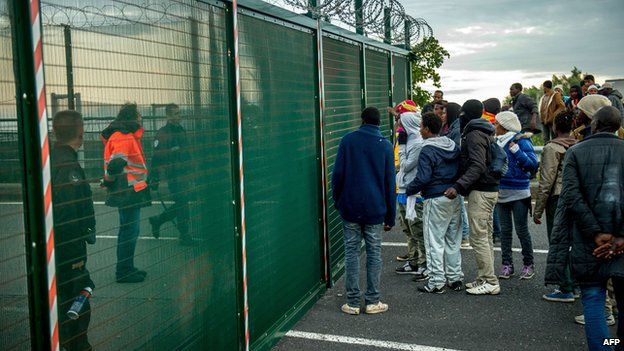Calais migrant crisis: Cameron warns UK is 'no safe haven'
- Published

The UK will not become a "safe haven" for migrants in Calais, David Cameron has warned, after hundreds continued their attempts to cross from France.
The prime minister warned illegal immigrants would be removed, as migrants told the BBC they remained determined to reach the UK.
Mr Cameron was speaking after people gathered for a third night at fencing at the Channel Tunnel freight terminal.
Over 3,500 attempts have been made this week to get into the tunnel.
6,000 lorries
New fencing supplied by the UK government is being installed in Calais and Eurotunnel said it would protect the platform area where vehicles are loaded on to the train shuttles to "stop the migrants... trying to jump on to the train shuttles there".
Meanwhile, Kent Police has for the first time asked for neighbouring forces to provide officers to help in the policing of Operation Stack - where lorries wait on the M20 in the county when Channel crossings are disrupted.
Highways England said there were nearly 6,000 lorries parked on the motorway as part of Operation Stack, which will continue into the weekend.
'Swarm of people'
Eurotunnel said security guards and police logged more than 300 attempts to enter its site in Calais overnight on Wednesday. The figure was down from 1,500 the previous night, a drop the company attributed to an increased French police presence.
Speaking in Vietnam during his tour of South East Asia, Mr Cameron said: "Everything that can be done will be done to make sure our borders are secure and make sure that British holidaymakers are able to go on their holidays," he said.
David Cameron said the government was ''totally focused'' on the migrant issue in Calais
The prime minister said the situation was "very testing" because there was a "swarm of people coming across the Mediterranean, seeking a better life".
The Refugee Council attacked Mr Cameron's use of the word "swarm" as "irresponsible, dehumanising language".
Labour leadership contender Andy Burnham said the comment was "disgraceful", while Lib Dem leader Tim Farron described it as "deeply alarming" as he was talking about "some of the most desperate people in the world".
Zoe Gardner of Asylum Aid: ''It's absolutely disgraceful - we need far more political courage and foresight''
The last official estimates suggest there are about 3,000 migrants in the port town in northern France.
It is not known how many migrants have reached Britain in recent months via the tunnel although MP Keith Vaz said police had told him 148 were held in Folkestone on Tuesday after about 2,000 migrants breached security in Calais.
Meanwhile, Kent County Council said its children's social services department was under "enormous strain" - it is currently caring for 605 unaccompanied asylum-seeking children.
Raihan Jan, 24, a clerk from Afghanistan, said he had travelled through Iran, Turkey, Greece and Italy before reaching Calais four days ago.
"We know it's very dangerous, but there is not another way to go the UK," he said.
English literature graduate Mohammad Al-Mohammad, 26, said he had fled Syria's civil war, arriving in France three months ago.
'Xenophobic response'
The Eurotunnel rail shuttle has been delayed in recent days, but is now operating to schedule.
Paul Adams spent one night with some of those who have been trying to gain access to the tunnel again and again
Conservative MP David Davies has echoed calls for the Army to be sent to Calais and urged the government to build camps in the countries migrants were from so they could be "sent back in a kind and humane fashion".
Senior UN official Peter Sutherland said demands for migrants to be kept out of the UK were "a xenophobic response to the issue of free movement".
Humza Yousaf, the Scottish government's Minister for Europe, said: "By refusing to take its fair share of vulnerable migrants... the UK government has turned its back on those in desperate need of help and, in turn, has contributed to the situation that has now developed."
At the scene
Lucy Williamson, BBC correspondent
As night fell on Wednesday, the road towards the Channel Tunnel started to come alive. Groups of 10 or 12 migrants moved steadily along the darkened highway, jackets pulled close, hoods up.
After a day of discussion in Paris and London over how to secure the tunnel, and fresh deployments of riot police, the determination of Calais' migrants seems unchanged.
They include people like Jamal - an Ethiopian who arrived here on Wednesday.
He said he'd spent most of his adult life doing military service in the Ethiopian army, had spent 10 days drifting in the Mediterranean, and had crossed six different European countries to get here.
Not once had his dream of reaching England wavered. For Jamal, a barbed wire fence, or brush with police, might change his tactics, but probably not his goal.